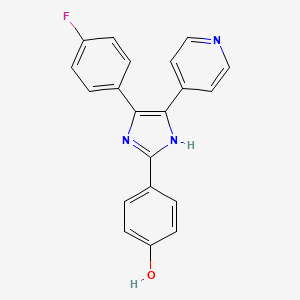m6A-centered Drug Response Information
General Information of the Drug (ID: M6APDG02214)
| Name |
Oxindole 94
|
||||
|---|---|---|---|---|---|
| Synonyms |
SB 202190; 152121-30-7; SB202190; SB-202190; FHPI; SB202190 (FHPI); UNII-PVX798P8GI; 4-(4-Fluorophenyl)-2-(4-hydroxyphenyl)-5-(4-pyridyl)-1H-imidazole; CHEBI:79090; 4-(4-fluorophenyl)-2-(4-hydroxyphenyl)-5-(4-pyridyl)imidazole; PVX798P8GI; SB 202190, Immobilized; C20H14FN3O; Phenol, 4-[4-(4-fluorophenyl)-5-(4-pyridinyl)-1H-imidazol-2-yl]-; 4-[4-(4-fluorophenyl)-5-(pyridin-4-yl)-1H-imidazol-2-yl]phenol; 4-[5-(4-fluorophenyl)-4-(pyridin-4-yl)-1H-imidazol-2-yl]phenol
Click to Show/Hide
|
||||
| Status |
Investigative
|
||||
| Structure |
 |
||||
| Formula |
C20H14FN3O
|
||||
| InChI |
1S/C20H14FN3O/c21-16-5-1-13(2-6-16)18-19(14-9-11-22-12-10-14)24-20(23-18)15-3-7-17(25)8-4-15/h1-12,25H,(H,23,24)
|
||||
| InChIKey |
QHKYPYXTTXKZST-UHFFFAOYSA-N
|
||||
| PubChem CID | |||||
| TTD Drug ID | |||||
Target Gene(s) and Their Upstream m6A Regulator, Together with the Effect of Target Gene(s) in Drug Response
The target genes involved in drug-target interaction (such as drug-metabolizing enzymes, drug transporters and therapeutic targets) and drug-mediated cell death signaling (including modulating DNA damage and repair capacity, escaping from drug-induced apoptosis, autophagy, cellular metabolic reprogramming, oncogenic bypass signaling, cell microenvironment, cell stemness, etc.) could be regulated by m6A regulator(s) and affected their corresponding drug response. You can browse detailed information on drug-related target gene(s) mediated by m6A regulators.
Prostaglandin G/H synthase 2 (COX-2)
Methyltransferase-like 3 (METTL3)
| In total 1 mechanisms lead to this potential drug response | ||||
| Response Summary | Prostaglandin G/H synthase 2 (COX-2) is a therapeutic target for Oxindole 94. The Methyltransferase-like 3 (METTL3) has potential in affecting the response of Oxindole 94 through regulating the expression of Prostaglandin G/H synthase 2 (COX-2). | [1], [2] | ||
Stress-activated protein kinase 2a (p38 alpha)
Insulin-like growth factor 2 mRNA-binding protein 2 (IGF2BP2)
| In total 1 mechanisms lead to this potential drug response | ||||
| Response Summary | Stress-activated protein kinase 2a (p38 alpha) is a therapeutic target for Oxindole 94. The Insulin-like growth factor 2 mRNA-binding protein 2 (IGF2BP2) has potential in affecting the response of Oxindole 94 through regulating the expression of Stress-activated protein kinase 2a (p38 alpha). | [3], [4] | ||
Methyltransferase-like 3 (METTL3)
| In total 1 mechanisms lead to this potential drug response | ||||
| Response Summary | Stress-activated protein kinase 2a (p38 alpha) is a therapeutic target for Oxindole 94. The Methyltransferase-like 3 (METTL3) has potential in affecting the response of Oxindole 94 through regulating the expression of Stress-activated protein kinase 2a (p38 alpha). | [4], [5] | ||
YTH domain-containing family protein 3 (YTHDF3)
| In total 1 mechanisms lead to this potential drug response | ||||
| Response Summary | Stress-activated protein kinase 2a (p38 alpha) is a therapeutic target for Oxindole 94. The YTH domain-containing family protein 3 (YTHDF3) has potential in affecting the response of Oxindole 94 through regulating the expression of Stress-activated protein kinase 2a (p38 alpha). | [3], [4] | ||
References